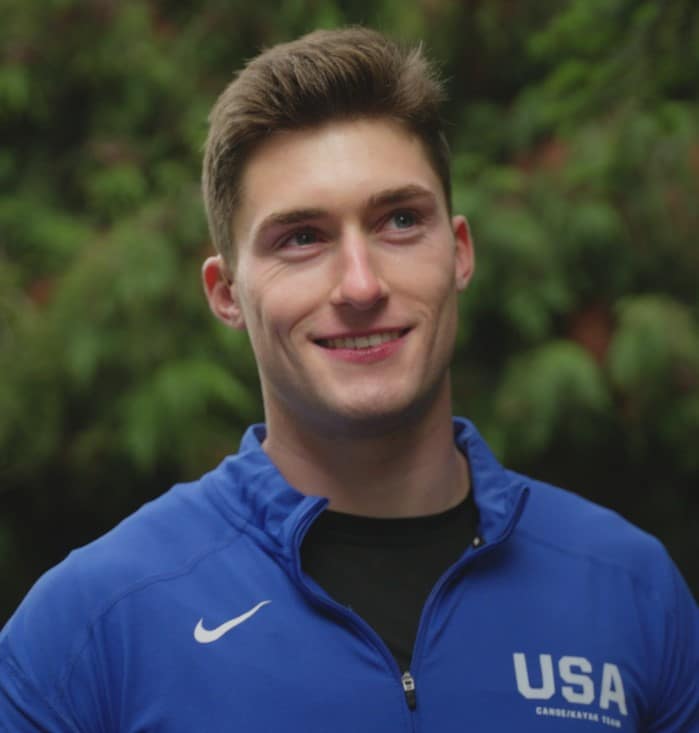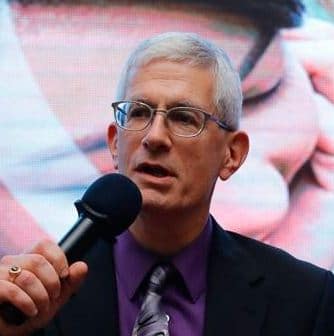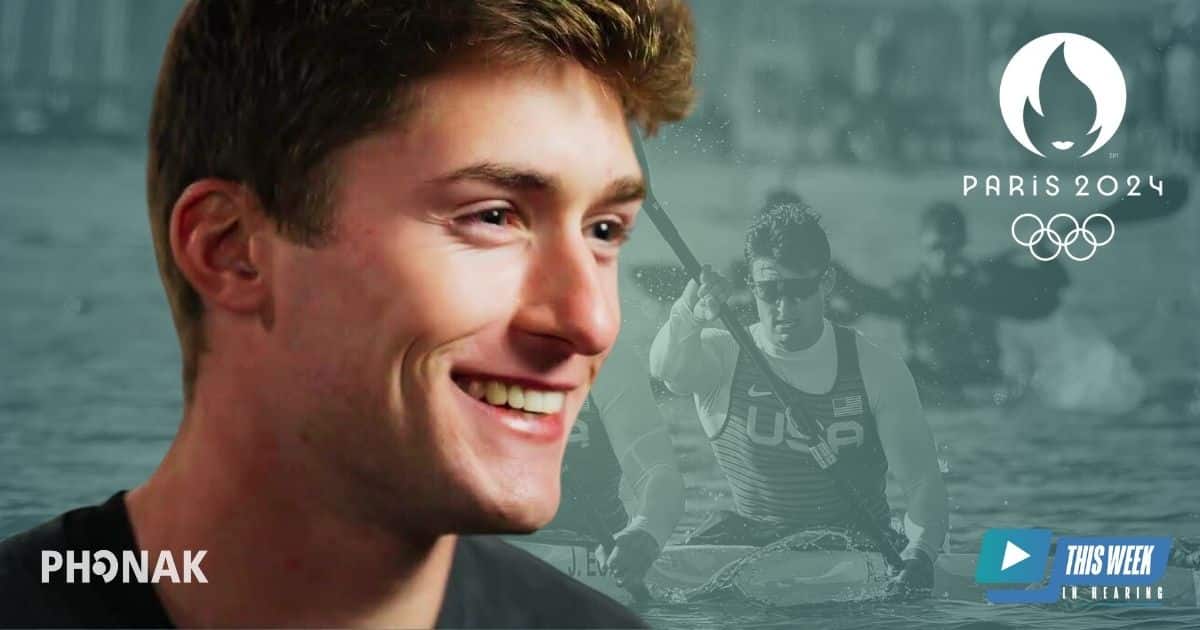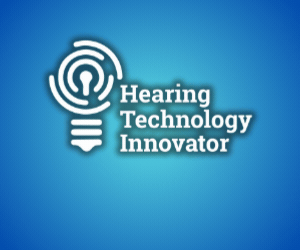Host Andrew Bellavia is joined by U.S. sprint kayak champion and Olympic athlete Aaron Small, who has recently been named a Global Brand Ambassador for Phonak. As he prepares to compete in the 2024 Olympics in Paris later this month, Aaron shares his journey of overcoming hearing loss challenges, balancing a rigorous training schedule, and excelling academically.
In their candid conversation, Aaron touches on the stigma associated with hearing loss and the significance of advocating for hearing health. He explains how his partnership with Phonak enables him to inspire others and promote inclusivity. Aaron also highlights the benefits of Bluetooth connectivity and real-time captioning software, which have greatly enhanced his communication experience.
- Learn more about Aaron’s story here
- You can follow Aaron on Instagram here
Full Episode Transcript
Hello everyone, and welcome to This Week in Hearing. I know people who are so stigmatized by their hearing loss that they do their very best to keep it from others. It’s important that their feelings be acknowledged and that hearing care and devices be delivered that enable them to live comfortably in the wider world. At the same time, I’m grateful for those who are open to being seen wearing hearing devices and discussing their hearing loss as part of their life’s journey. The stigma will be reduced as the general public sees more and more people with hearing loss leading enjoyable lifestyles and achieving success. My guest today is one of those, Aaron Small, whom I will introduce by way of congratulating him for having just earned his bachelor’s degree in oceanography with a minor in American Sign Language, while at the same time winning a spot on the US Olympic team in double sprint kayak. I’d say that counts as success. Welcome to the show, Aaron, and thanks for carving out some time as you prepare for competition in Paris and also in Bulgaria. What else should people know about your background? Thank you so much for having me, Andy. I’m very excited to do my first podcast ever. I think you summed it up pretty well. I’m a sprint kayaker. Just qualified for the Olympics. I will correct one thing though. I didn’t actually receive my minor in American Sign Language. I was about one class short because I didn’t have time to complete it. But I’ve got lots of studies in American Sign Language. Outside of that, I trying to figure out what to do for work. Now, but I’m training full time, just trying to get through this summer. It’s going to be a super, super exciting summer. Competing and lots of travel. Yeah, quite a busy time for you. And an exciting one too. How did you actually get started in competitive kayak and what would you say, aside from the obvious things, like willingness to work hard, what were your keys to success in the sport while earning your degree at the same time? Yeah, I started kayaking with the Seattle Canoe. and Kayak Club on Green Lake in Seattle. And originally my parents, I think, just wanted me out of the house for a little bit during the day to run down my energy, and I really enjoyed. It because I got to. It’s an amazing community of athletes and I made a lot of friends there. And as I started transitioning more to the competitive side and got enrolled in college, it took a lot of time management as a skill to balance full time training. Two sessions on the water plus a gym, and then also full time course load. Yeah, I’ve got to imagine time management was almost essential. And, of course, you’re doing all this while accommodating your hearing loss, too. Tell us about your hearing loss journey. Yeah, I was diagnosed with hearing loss in kindergarten because it was actually because my kindergarten teacher was noticing us saying ‘what?’ a lot to, like, all of her questions, and she’s like, “you should have your parents take you in for an audiogram”. And so I did and didn’t pass, obviously, and I’ve been wearing hearing aids ever since, and it’s It’s been super awesome. I’m really glad to have this opportunity now as this unique opportunity as a pro athlete competing at the Olympics, but also a hearing loss ambassador for Phonak, because I think I can hopefully bridge the two between sport and hearing loss and advocate for people who maybe are still under the influence of the stigma behind it and wearing hearing aids. Well, and that leads nicely into what I want to ask you next, because, and I’ll preface this by saying I won’t even pretend to be competing at the same level that you are. And also, my own hearing loss began in adulthood, but I found that the way I think about in my hearing loss and I talk about it with others is informed a lot by my experience distance running over time. And maybe the reverse is true, too. The distance running helped me think about hearing loss, you know, in both directions. Is it really the same with you? I mean, do you find that your sport journey and your hearing loss journey are intertwined? You know, I think there’s definitely some some overlap. It’s been. It’s always just been a part of my life. I think I started, like, I’ve been hearing loss, had hearing loss since I was a little kid, and I’ve been paddling since I was a little kid. So they’ve kind of, kind of like, if you have a baby at the same time you have a puppy, they grow up together. That’s the best way to put it. But I think they’ve. I’ve had a really amazing, supportive community behind me through paddling, that also understand that, you know, I need certain accommodations, and I need them to look at me when they talk to me so I can understand what they’re saying and that kind of thing. Okay. Okay. And, you know, as I was doing my homework for this discussion, I read the Phonak blog that was written about you in December last year. And at the bottom it says it, and I’m quoting a blog, Aaron wears the Phonak Audeo Life Lumity, the world’s first rechargeable waterproof hearing aid. And before I ask the main question, I have to poke fun in Phonak because I’m actually wearing what was the first waterproof hearing aid. That’s the Paradise Life, the predecessor model to the one you have. And I’m also wearing my in the water kit. In honor of this conversation, I put the water kit on with a hat tip to Deafmetal because, as I found out, and maybe you have, too. Its not enough to have waterproof hearing aids, but they can still get knocked out in the surf, waterproof or no. And for my part, I think waterproof’s a great feature, and I’ve talked about it before. For example, if I’m just out playing the water with people, I can talk to them, and I can actually understand what they’re saying. And if I run with friends and it’s raining, I don’t have to worry. I could converse with them and not worry about the devices getting destroyed. But for you, it’s got to be really essential to communicate with your kayak partner and your coaches and so on to be able to hear well. What did you do before waterproof hearing aids were available? How did you accommodate your hearing loss then? Yeah those are all very great points you’re making. I think before I had waterproof hearing aids from Phonak, it was a lot of. There was definitely some miscommunication, definitely a lot of repeating things and, you know, making sure you’re close enough on the water that you can actually hear them. Its I’m sure, as you know, as someone with hearing loss, is very draining to listen to someone talk if you can’t understand everything they’re saying, and then having to have them repeat it over and over that was a big part. And then one of the other things about about sprint paddling that I love is it’s. It’s so like, you’re out on the water, and sometimes you’re just all by yourself. There’s no one else, so you really, like. Sometimes I won’t wear my hearing aids when I paddle, and I can just tune everything out. I don’t have to worry about, like, listening to people. But when I do have coaches on the water and I do have training partners on the water, it’s really helpful to – to be able to understand them now. It’s actually funny because a lot of that resonates a fair amount of the time when I’m out running, I don’t wear them. I never wear them when I’m doing speed work because I just want that bubble. Right. But if I’m. If I’m going long at cruising speed, I love to put them in because you can hear all the birds I run, so you hear all the birds and the other, you know, nature sounds and whatnot, and it’s you know, really great to have it both ways, I guess. And I understand how you get into that meditative state almost when you can tone things down a little, but at the same time, being essential to communicate with people certain times, too. So. Yeah, that makes a lot of sense. And how long have you been wearing the waterproof hearing aids then? I got them beginning of last year, so about a year and a half. Okay Yeah. Okay. Okay. And, yeah, you said something which. Which I tell people a lot, and I think it’s important. I want to highlight what you said about the fatigue that comes from not being able to hear. Well. That’s always the first thing I tell people, is, it’s amazing how much more energy you have when you can hear properly. I didn’t even realize it until I first started wearing them. I’m like, this is completely different. It’s an immediate benefit to have that much more energy and to not be cognitively fatigued at the end of whatever day it is, whether it’s a regular workday, whether it’s competing at international level, whatever it is. I think that’s a very important point to make to people because it’s not like in the foggy future, like when people talk about the risk of dementia, for example. It’s something that will benefit you the moment you address your hearing loss. So thanks for making that point, specifically. Yeah, that’s. Yeah, that’s. That’s actually something I even realized just day to day. Like, if I – If I wake up and I go to the kitchen and I start making food and someone else walks in and I haven’t put in my hearing aids, I’ll immediately realize that it’s taking a little bit extra energy to listen, and I have to focus more, and then I’ll go back, put them in, and, yeah, I. It’s very immediate solution. So you’ve been wearing the waterproof for a year and a half, so your relationship with Phonak must go at least that far back. I mean, how did your relationship with Phonak develop, and how did it culminate in the recent announcement that you’ll be a global brand ambassador? Yeah, I started as a Phonak advocate about a year and a half ago, and that came where I was. I was talking to them because they. They’re really focused on the hearing as a part of you improving well being and improving quality of life, because hearing health it really plays a big role in that. And I was, I really liked that side of it. And then I also really liked all the amazing, like, innovation that they do, like with, especially the first water proof hearing aids, because my sport is a water sport. And so I thought that would be a good match, and I guess it worked out pretty well. Well, that’s that’s really, I mean, I love it because you’re putting yourself out there as an advocate, speaking openly. And how did you actually come to do that? How did you come to realize that you had something to say, something positive, contribute, and, you know, be willing to do that? How did that come about? Yeah, I, I think when I was a little kid, I definitely never would have expected to be in this position because I, as an example, I used to intentionally leave my hearing aids at my house when I was a little kid going to elementary school because I didn’t want other kids to see with them because there was, you know, all the stigma behind hearing loss and hearing aids. Little kids are going to say mean things. You can’t really do anything about it. But my mom would bring them to me at school and be like, oh, thank you, mom. But really, like, like, that’s good. There’s no, no issues wearing hearing aids. Hearing aids are super cool. I mean, as an example, I’m wearing bright blue Phonak hearing aids now. Like, it’s pretty hard to miss. So I think, I think it’s you know, I’m in a good oppor – in a good position to advocate for hearing loss. Well, and it’s terrific that you’re doing so. And then you were able to overcome and almost don’t want to use the stigma, but, you know, fun being made of and all that sort of thing as kids will do with, you know, with people who are different in some way that you were able to overcome those feelings and be able to speak openly about it. Hats off to you for that. A big credit to Phonak, too, because they, you know, they’re really focused on that part of hearing health, like, increasing. So as an ambassador, how does that actually work? What will you be doing going forward? It’s a lot of stuff through like, social media, spreading awareness like that. And then I’ve been doing some, like, live speaking engagements with, sometimes focus on the paddling side, sometimes have aspects of, of hearing health and how my journey as a hard of hearing athlete has progressed. And so I think it’s going to be more of, more of that in the future, spreading awareness through social media and other platforms. Okay. And so then if somebody wants to reach out to you in that capacity, how would they do it? I mean, understanding you’re going to be busy for the next month or so. Oh, I love to hear people message me sometimes about hearing loss. And I love to have those conversations. Just reach out to me through my instagram. I’m sure you can find it. And search Aaron small on Instagram or @small.aaron and shoot me a message. I’d love to talk about hearing loss or sports or whatever else you’d like to chat about. Okay, terrific. Thats really. That’s excellent. That’s excellent. And before. Before we end do you have anything else you want to share? Any final thoughts? I would like to mention that one of the features that I really love about. About Phonak hearing aids and a lot of hearing aids technology now is the Bluetooth because you can stream it directly. But I’ve recently started using CaptionMate, which is a real time captioning software on your phone. And having those paired, I can stream the phone call directly to my hearing aids and then also read it as it’s happening and it makes it, I spend so much less energy thinking about, about what people are saying. It’s really amazing. Yeah, well, very good point. Because the direct streaming hearing aids is the best because you remove the room reverberations and you get the corrected audio directly to your ears. I’m actually on the receiving side on Bluetooth to my computer right now. I’m wearing a microphone. So my conversation. But yeah, the Bluetooth connectivity is actually one of the key features. Goes back to the to the fatigue thing too, because you have a day full of Internet meetings, if you’re not hearing at your best, you will be fatigued at the end of that day. So no question about that. So yeah, actually very good point. Very good point. Well, do you ever use a Roger mic too? Have you used those before? There it is. There you go. Oh, very much so. Very much so. I’m still learning how to use it in different situations. But I found a lot of times it’s a really, really helpful. Yeah, I use it in school sometimes and then in like big, big group settings, you can set it down on the table and it’ll like automatically find who’s talking to you. Yeah. And that was one of the things I learned. I tried that in a loud restaurant, but the problem is it picks up everything. So you’ve got to like be more focused about the directionality there. But I’ll also throw out there. Maybe this will be useful to you is if I go somewhere where they have an assistive listening system because these don’t have a telecoil in them. And a lot of places do the FM system anyway. You can plug the Roger mic into the FM receiver. So I do that all the time. I take the audio cable. So I’ll plug this into the FM receiver, this into the roger and I can just set the FM receiver next to me and then just let it stream up. That works really well. Yeah I used to have, when I was in elementary school, I had the boots that connect on the bottom of your hearing aids. I don’t know if you’re familiar with the stream directly from the FM. Yeah, yeah, exactly. Now of course, you have the receivers, the Roger receivers built right in. Well, thanks. I mean, I really appreciate you spending a little time, especially being so busy right now. Godspeed to you and your kayak partner Jonas Ecker. I’ll be watching the both of you, and I’m fully expecting you’re going to show off that waterproof hardware by rolling your kayak after a race. Thank you so much for having me. I will do my best to do that rolling thing, but can’t say I’ve had any luck so far. Well, good luck to you both in both competitions. And thanks to everyone for watching or listening to this edition of This Week. In Hearing.
Be sure to subscribe to the TWIH YouTube channel for the latest episodes each week, and follow This Week in Hearing on LinkedIn and on X (formerly Twitter).
Prefer to listen on the go? Tune into the TWIH Podcast on your favorite podcast streaming service, including Apple, Spotify, Google and more.
About the Panel
 Aaron Small, a first-time Olympian and Global Brand Ambassador for Phonak, is dedicated to raising public awareness about hearing health and overcoming the stigma associated with hearing loss. At 22, Aaron has already made significant strides in the world of sprint kayak, highlighted by his achievements at the Pan American Games and a gold medal at the Olympic Qualifiers this past April. As he prepares to compete in the Paris Olympics, Aaron continues to inspire others with his story, emphasizing the importance of hearing devices and encouraging individuals to pursue their dreams despite any limitations.
Aaron Small, a first-time Olympian and Global Brand Ambassador for Phonak, is dedicated to raising public awareness about hearing health and overcoming the stigma associated with hearing loss. At 22, Aaron has already made significant strides in the world of sprint kayak, highlighted by his achievements at the Pan American Games and a gold medal at the Olympic Qualifiers this past April. As he prepares to compete in the Paris Olympics, Aaron continues to inspire others with his story, emphasizing the importance of hearing devices and encouraging individuals to pursue their dreams despite any limitations.
 Andrew Bellavia is the Founder of AuraFuturity. He has experience in international sales, marketing, product management, and general management. Audio has been both of abiding interest and a market he served professionally in these roles. Andrew has been deeply embedded in the hearables space since the beginning and is recognized as a thought leader in the convergence of hearables and hearing health. He has been a strong advocate for hearing care innovation and accessibility, work made more personal when he faced his own hearing loss and sought treatment All these skills and experiences are brought to bear at AuraFuturity, providing go-to-market, branding, and content services to the dynamic and growing hearables and hearing health spaces.
Andrew Bellavia is the Founder of AuraFuturity. He has experience in international sales, marketing, product management, and general management. Audio has been both of abiding interest and a market he served professionally in these roles. Andrew has been deeply embedded in the hearables space since the beginning and is recognized as a thought leader in the convergence of hearables and hearing health. He has been a strong advocate for hearing care innovation and accessibility, work made more personal when he faced his own hearing loss and sought treatment All these skills and experiences are brought to bear at AuraFuturity, providing go-to-market, branding, and content services to the dynamic and growing hearables and hearing health spaces.







